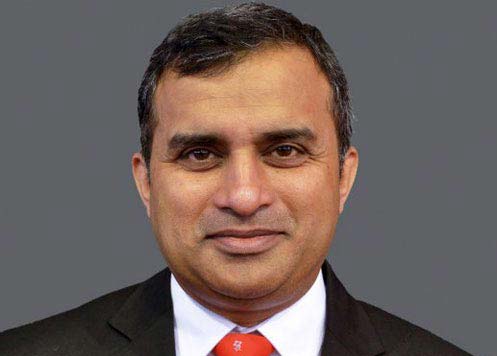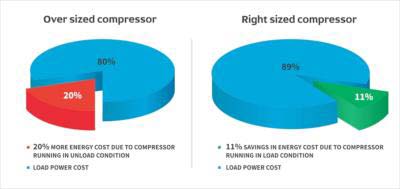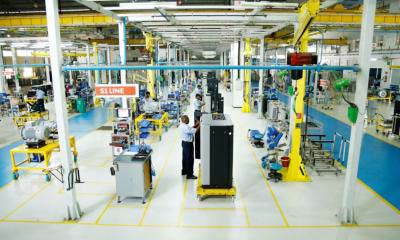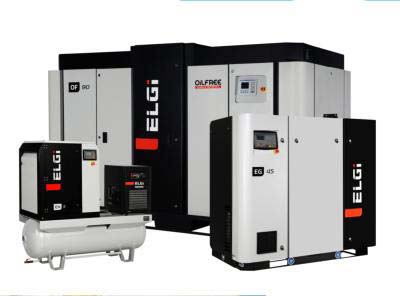Predictive maintenance support is a significant step to be more customer-centric

Rajesh Premchandran, Director – ISAAME, India, South Asia, Africa and Middle-East, Elgi Equipments Limited.
What are the recent developments at ELGi in terms of innovations?
At ELGi, our definition of Always Better is closely coupled with us always being the customer’s choice. And our 400+ product range bears testament to this; for example, the lubricated screw [ELGi Global (EG) series and Encapsulated (EN) Series] and oil free screw air compressors are highly reliable, energy efficient and operate at low energy costs. Our Oil free (OF) series and ‘Always Better’ (AB) series of oil free screw compressors are class zero certified by TUV in accordance with the ISO 8573 standards and the (HRS) heat recovery systems help companies recover approximately 96% of the waste heat generated during the compression process which can then be re-utilised for heating of air and water.
We’ve also innovated to address the compressed air needs of companies who have historically suffered the constraints of high cost, poor reliability, and low efficiency in order to have oil free air. The ELGi AB ‘Always Better’ series, a disruption in oil free compressed air technology, offers every customer across the globe, a no-compromise, oil free solution at approximately 8 – 10% reduced lifecycle cost when compared with prevailing oil free technology. Finally, our compressed air experts across the world offer specialised services to help customers identify potential areas of energy savings and provide them with solutions guaranteeing the optimum use of compressed air.
Compressed air consumption is a measure of a plant’s automation level, it is said. Your comment?
The use of compressed air in the automation industry offers the following benefits compared to use of other systems for the same application:
- The systems are easier and simpler to use. Pneumatically operated tools and nozzles are more compact and have lesser maintenance.
- Air can be used in multiple environments without the risk of catching fire.
- Air can be easily transported to multiple locations with the use of compressed air piping.
This has resulted in extensive use of compressed air systems in the automation industry. But a poorly designed system without a good understanding of the air needs can result in wasted energy and higher costs of operation. The challenges that customers face is normally an inability to foresee in advance increase and decrease in demand due to varying production needs on the shop floor. This can result in increased electricity costs. Of all the energy used in manufacturing, compressed air systems have potential for improvement. World over, compressed air systems consume energy and also result in wasted energy costs due to preventable maintenance issues and inefficient operations.

Right sizing is sufficient for those customers with stable air demand. Customers who have varying demand patterns during the day or those customers who anticipate an increase in manufacturing capacity during seasons can save up to 28% with Variable Frequency Drives (VFDs).
A VFD works by reducing the compressor motor’s speed to lower flow to match the actual air demand of the customer and there by consume lower power when compared to a fixed speed machine which would unload in the same conditions, thereby significantly reducing unload energy consumption. Furthermore Heat Recovery Systems (HRS) help companies to recover approximately 96% of the waste heat generated during the compression process which can then be utilised for heating air (space) or water. This in turn eliminates additional equipment requirements to heat water or air, thereby eliminating the CO2 emissions to a large extent. They are best suited for customers across process industries spanning paper, sugar, food and beverages, dairy, textiles, etc., mainly companies who require compressed air and use hot water for their process requirements.
Compressors can be energy guzzlers if not used properly. What are the measures manufacturers take to educate the customer and optimise the utility?
The first thing that we do is understand our customer’s compressed air needs. For example, for an application like spray painting using pneumatic guns, the compressed air directly mixes with the paint. In this case, based on the flow, pressure and the quality of compressed air required, we suggest the right compressor and the ideal downstream accessories required for this application. The illustration shows the benefits that a customer get out of a right sized compressor. To avoid pressure drops between the compressed air generation and the utility points, we recommend the right sized compressor, pressure, and positioning of the compressor in the given layout to have the desired air pressure at the application points. We also advise customers to build an effective compressed air distribution system and employ energy saving air audit programs and implementation of compressed air monitoring processes to run an efficient compressed air system in their facilities. Regular training to the customers on compressor maintenance and importance of periodic change and use of genuine parts and consumables help them to gain efficiency and significantly reduce maintenance costs.
It is not just products, but solutions that customers expect today. What are the services you offer for this?
As discussed earlier, our compressed air experts across the world offer specialised services to help customers identify potential areas of energy savings and provide them with solutions guaranteeing the optimum use of compressed air. We engage with customers through structured air audit programs that enable us to study the customer’s application pattern and recommend solutions that can significantly save energy. Our air audit programs have helped customers identify energy saving opportunities resulting in the savings of over $9 million. Also, ELGi’s predictive maintenance support is a significant step in our efforts to be more customer-centric and data-driven as we seek to provide the most efficient compressed air solutions. Gathering data is easy, but analysing the data and providing meaningful insights to customers is what constitutes the future. For example, the ELGi team collated data for a piping company and the resulting recommendations contributed to over 40% energy savings. In the case of a textile company, our IoT system recorded an abnormal pressure reading that helped us identify a choked air-filter.
Compressed air as a service is a model followed by some manufacturers and service providers. How does this work in practice?
Compressed air as a service or rental compressor business is at a nascent stage in India. The small and medium scale industries require piston and screw air compressors for short term compressed air needs. Owing to limitations in installation, piston compressors taken for rent ranges only up to 15 hp. For air requirements ranging from 15 to 100 hp, screw compressors are preferred for rental service.

Portable compressors are the preferred choice for rental when it comes to huge construction, infrastructure, oil & gas and drilling projects. Compressed air rental business has so far witnessed marginal growth in the tier 1 and tier 2 cities across India and the future growth of this business will be purely based on the growth of small, medium scale industries and the large scale construction and infra projects across the nation.
So is ELGI on track for the Mission 2027 in terms of the global No.2 spot?
“Conquer K-2 (CK2)” – our aspiration to be the No. 2 in the Global Air Compressor Market by 2027, draws inspiration from Mount K2, the second highest peak in the world and arguably, the toughest peak to ascend among the eight thousanders. To accomplish our aspirational targets, our market facing dimension of strategy (Where to Play?), includes, in addition to organic growth, business acquisitions across the world with specific focus on India, Europe, USA, Australia, Indonesia and Thailand. On the value proposition dimension of strategy (how to win?), we are focusing on innovation centred around energy efficiency and oil-free and quality to be the best in the world. We believe that delivering strongly and reliably on these value propositions, will set us apart from competitors and build our business globally. Today, we do business in more than 120 countries with direct presence in 28 countries. We have our own manufacturing facilities in India, Italy and the USA with subsidiaries in Australia, Brazil, UAE and Indonesia. At this moment, more than 2 million ELGi air compressors are driving critical applications across various industries verticals, supported by a strongly knit sales and service network of 2000+ people and 200+ distributors, worldwide.
Any comments on the Covid-19 crisis and the impact on the global business as a whole?

Well, the pandemic has certainly disrupted global supply chains and international trade. We are anticipating challenges in demand, supply, employee safety and general business continuity. Our teams are engaged with predicting and planning for the consequences of Covid-19. As we gain more comfort around this new normal, we will refocus our attention on our strategic markets and initiatives towards CK2, our ambition to be second largest compressed air manufacturer in the world.
Rajesh Premchandran is Director – India, South Asia, Africa and Middle-East, Elgi Equipments Limited, and an experienced senior leadership professional with a demonstrated track record of growing business in the mechanical, HVAC and mechanical engineering industry. Skilled in distribution channel and key account management, Rajesh is a people oriented leader specialising in Sales, Marketing and Business Development.
VIEW ARTICLE

